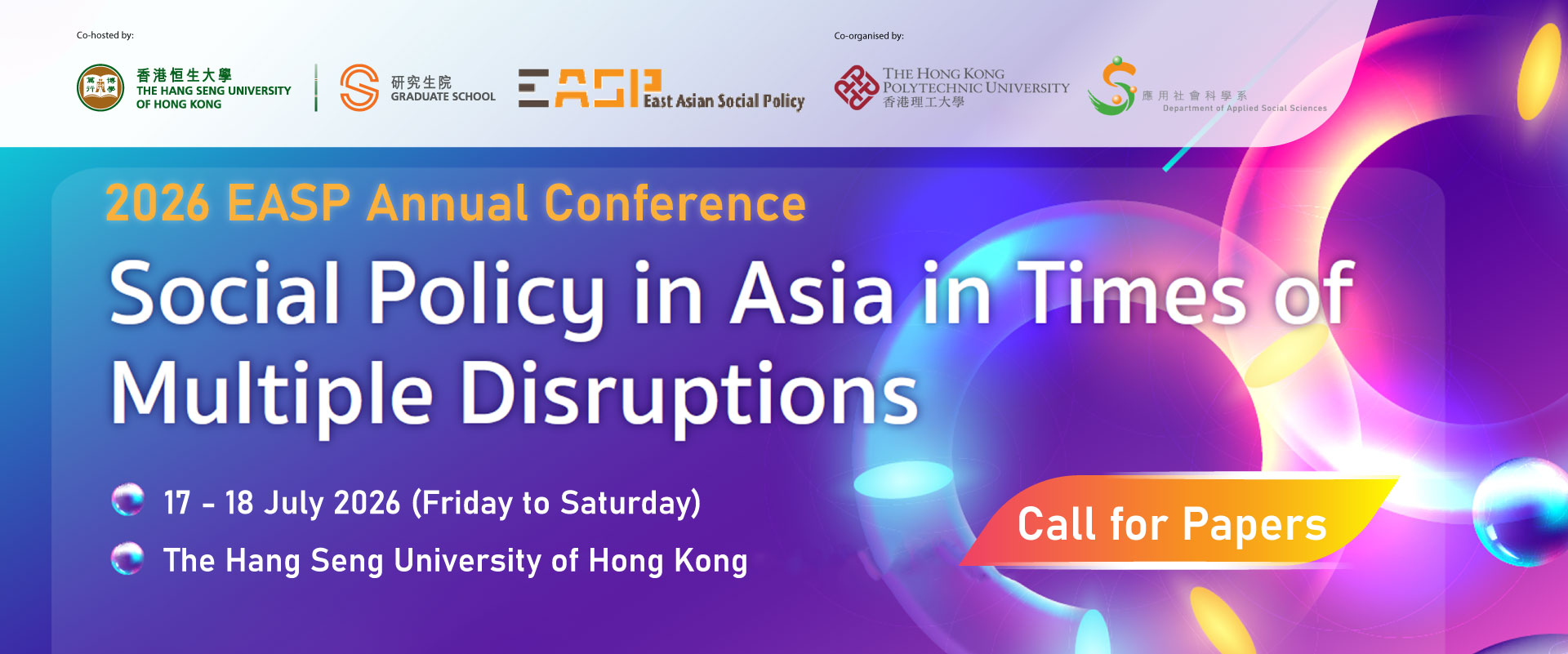- 17 - 18 July 2026

17 – 18 July 2026 (Friday to Saturday)
The Hang Seng University of Hong Kong |In-person Only
Introduction
In light of the complex challenges shaping our world today, the 2026 EASP Annual Conference – Social Policy in Asia in an Era of Multiple Disruptions seeks to bring together scholars and practitioners to exchange ideas, share research, and foster meaningful collaboration. The conference is co-hosted by the Graduate School of The Hang Seng University of Hong Kong and the East Asian Social Policy Research Network (EASP), and co-organised with the Department of Applied Social Sciences (APSS) of The Hong Kong Polytechnic University. The event will be held on 17–18 July 2026 (Friday to Saturday) at The Hang Seng University of Hong Kong (HSUHK) and will take place in person only.

We are living in an era defined not by a single crisis, but by a cascade of interconnected disruptions that are fundamentally challenging the sustainability of our societies, economies, and daily lives. The COVID-19 pandemic was not an isolated event but a stark reminder of our encroachment on the ecosystem. It has left a lasting impact on our social and economic systems, revealing new vulnerabilities and persistent instabilities that continue to shape our societies. In the same vein, the accelerating climate crisis—itself a consequence of unsustainable human development—presents an existential threat, demanding a fundamental transformation of our production and lifestyles.
This 'polycrisis' is further complexified by deep structural shifts. The rapid advance of digitalization and Artificial Intelligence (AI) promises innovation but also signals a fundamental disruption of employment and social structures, raising new questions about inequality and human agency. Profound demographic changes, including persistent low fertility, rapid aging, and diversifying family structures, reveal that our existing social contracts are no longer sustainable.
Furthermore, these disruptions are unfolding within a volatile global context. Geopolitical instabilities, the resurgence of nationalism and xenophobia highlighted by migration crises, and cost-of-living pressures intensified by trade tensions all demonstrate that social policy can no longer be adequately conceived or implemented solely within national borders.
These 'multiple disruptions'—environmental, technological, demographic, and geopolitical—are not parallel but deeply intertwined, creating new, multi-dimensional challenges for social policy. They demand a fundamental rethinking of our established analytical frameworks, governance models, and institutional arrangements. This new reality requires us, as a research community, to move beyond single-issue analysis and seek complex, multi-dimensional solutions that adequately address these intersecting crises.
The EASP 2026 Annual Conference aims to convene scholars to critically examine these complex challenges. We seek to foster a robust discussion on how social policy is responding to, and being reshaped by, this era of multiple disruptions. Reflecting the network's commitment to broadening its scope, we particularly welcome research that includes the context of Southeast Asia alongside East Asia. We invite theoretical, comparative, and empirical papers that explore the intersections of these crises, assess the resilience and innovation of existing welfare systems, and propose new paradigms for a sustainable and just future.

Conference Streams
Please select one of the following streams for your submission. This list serves as a guideline; sessions will be organized based on the accepted papers.
Stream 1
Rethinking Social Policy in an Era of Polycrises
Stream 2
Post-Pandemic Legacies in Social Policy
Stream 3
Climate Change, Just Transitions, and Environmental Social Policy
Stream 4
Digitalization, Artificial Intelligence (AI), and the Future of Work and Welfare
Stream 5
Population and Demographic Shifts: Aging, Low Fertility, and Intergenerational Relations
Stream 6
Geopolitics, Conflicts, and Welfare under Uncertainty
Stream 7
Labour Markets, Precarious Employment, and Decent Work
Stream 8
Poverty, Inequalities, and Social Inclusion
Stream 9
Gender, Family, and Changing Social Roles
Stream 10
Health Security and Social Care Systems
Stream 11
Welfare States and Welfare Regimes (Comparative and Regional Perspectives)
Stream 12
Social Security, Redistribution, and Social Justice
Stream 13
Education, Skills, and Lifelong Learning
Stream 14
Housing, Urbanization, and Regional Development
Stream 15
Migration, Citizenship, and Diversity
Stream 16
Governance and the Role of the Nonprofit Sector
Join as Presenter
We invite submissions for individual paper abstracts and panel proposals.
- Individual Paper Abstracts: Submissions should be 200-300 words. The abstract should include the selected stream number, paper title, author(s) name(s), affiliation(s), and the email address of the corresponding author.
- Panel Proposals: Submissions should include a 200-300 word rationale for the panel, the stream number, the panel title, the names and affiliations of the panel chair, discussant(s), and 3-4 presenters, as well as abstracts (200-300 words) for each paper including an email address of one corresponding panel organiser.
All abstracts and panel proposals should be submitted via the Official Submission Portal.
Deadline: 11 March 2026 (GMT) (Extended)
2026 EASP Early Career Research Award
We are pleased to invite submissions of full papers for consideration for the EASP Best Paper Award for Early Career Researchers, sponsored by Lingnan University, Hong Kong.
Eligible applicants include:
(1) PhD students, and
(2) Researchers who have received their PhD within the past six years.
To qualify, the Early Career Researcher must be listed as the first author or corresponding author of the paper in the 2026 EASP Conference Program.
Submitted papers will be reviewed by the Best Paper Award Committee.
Submission deadline: Please submit your full paper (PDF or word format) by 1 June 2026 to: easp2026@hsu.edu.hk.
Please clearly indicate in the email subject line:" Paper Submitted for the PhD Student Award," or "Paper Submitted for the Early Career Researcher Award."
Registration Fees
Join us for a transformative discussion
Early Bird Rate
HK$2,200
HK$1,320
(Postgraduate Student Rate)
- Access to all conference sessions
- Networking lunches, coffee breaks & gala dinner
- Deadline: 15 May 2026
Regular Rate
HK$2,800
HK$1,680
(Postgraduate Student Rate)
- Access to all conference sessions
- Networking lunches, coffee breaks & gala dinner
- Deadline: 30 June 2026
One Day Pass
HK$1,700
HK$1,020
(Postgraduate Student Rate)
- Access for 1 day only
- Networking lunches and coffee breaks
- Deadline: 10 July 2026
Important Dates
- 23 February 2026
Submission Deadline for abstract and panel proposals - March 2026
Notification of Acceptance
Join as Participant
Join us as an attendee to network, learn from leading scholars, and participate in discussions.
Registration is scheduled to commence in March 2026.
Please subscribe to receive a notification:
Registration Fees
Join us for a transformative discussion
Early Bird Rate
HK$2,200
HK$1,320
(Postgraduate Student Rate)
- Access to all conference sessions
- Networking lunches, coffee breaks & gala dinner
- Deadline: 15 May 2026
Regular Rate
HK$2,800
HK$1,680
(Postgraduate Student Rate)
- Access to all conference sessions
- Networking lunches, coffee breaks & gala dinner
- Deadline: 30 June 2026
One Day Pass
HK$1,700
HK$1,020
(Postgraduate Student Rate)
- Access for 1 day only
- Networking lunches and coffee breaks
- Deadline: 10 July 2026
Contact
Further details about the conference programme and venue will be announced shortly. For any queries about the conference, please contact easp2026@hsu.edu.hk.
Hosted by
- Graduate School, The Hang Seng University of Hong Kong
- The East Asian Social Policy Research Network (EASP)
Co-organisers
- Department of Applied Social Sciences (APSS), The Hong Kong Polytechnic University



